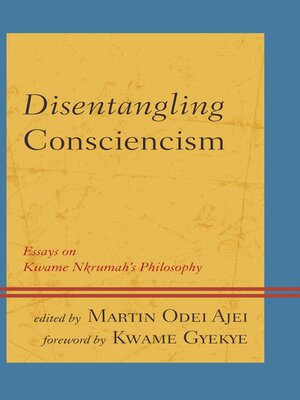Disentangling Consciencism
ebook ∣ Essays on Kwame Nkrumah's Philosophy · African Philosophy: Critical Perspectives and Global Dialogue
By Kwame Gyekye

Sign up to save your library
With an OverDrive account, you can save your favorite libraries for at-a-glance information about availability. Find out more about OverDrive accounts.
Find this title in Libby, the library reading app by OverDrive.



Search for a digital library with this title
Title found at these libraries:
| Library Name | Distance |
|---|---|
| Loading... |
Kwame Nkrumah is globally recognized as a foremost pan-Africanist strategist and statesman. He is less widely acknowledged as a philosopher, in spite of his considerable philosophical training, seminal contribution to African political theory, and incisive critique of the ethics of international relations. Consciencism has the distinctive status of being the only published book that Nkrumah consciously meant to be a work of his philosophy, yet it has failed to attract the focused attention of philosophers.
The chapters in Disentangling Consciencism: Essays on Kwame Nkrumah's Philosophy critically explore the metaphysical, ethical and political thought expressed in Consciencism. In doing so, they broaden our understanding of his philosophical ideas and their relevance for effective African contribution to thought in a contemporary world in which Africa increasingly totters on the margins of international affairs. In much of current moral and political thinking, there is a tendency to universalize liberal values and neglect non-Western philosophical perspectives. At the same time, global normative thinking is overwhelmingly applied in non-Western contexts. Writing from across three continents, the contributors to this volume establish greater intellectual connection among African, Asian and Western academics, and their chapters offer explicit perspectives on the value of Nkrumah's philosophy, and on the conceptual basis of early post-colonial public policy options in Africa. A valuable appendix provides the text of speeches delivered at the 1964 launch of Consciencism.
With insights into numerous dimensions of Nkrumah's philosophy, this volume will be of particular interest to students and scholars of philosophy—especially of non-Western metaphysical, moral and political thought—and to anyone working in the history of African political theory.
The chapters in Disentangling Consciencism: Essays on Kwame Nkrumah's Philosophy critically explore the metaphysical, ethical and political thought expressed in Consciencism. In doing so, they broaden our understanding of his philosophical ideas and their relevance for effective African contribution to thought in a contemporary world in which Africa increasingly totters on the margins of international affairs. In much of current moral and political thinking, there is a tendency to universalize liberal values and neglect non-Western philosophical perspectives. At the same time, global normative thinking is overwhelmingly applied in non-Western contexts. Writing from across three continents, the contributors to this volume establish greater intellectual connection among African, Asian and Western academics, and their chapters offer explicit perspectives on the value of Nkrumah's philosophy, and on the conceptual basis of early post-colonial public policy options in Africa. A valuable appendix provides the text of speeches delivered at the 1964 launch of Consciencism.
With insights into numerous dimensions of Nkrumah's philosophy, this volume will be of particular interest to students and scholars of philosophy—especially of non-Western metaphysical, moral and political thought—and to anyone working in the history of African political theory.







